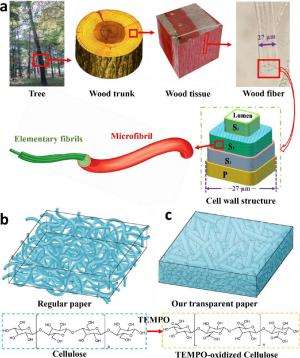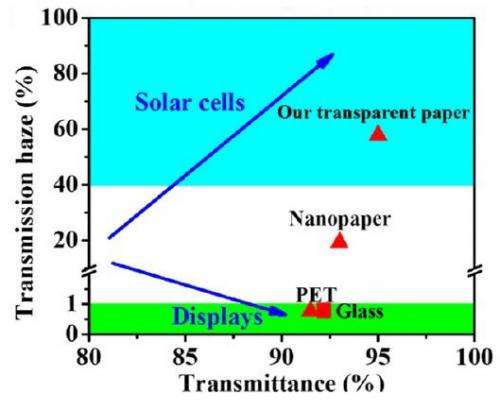January 23, 2014 feature
Future solar cells may be made of wood

(Phys.org) —A new kind of paper that is made of wood fibers yet is 96% transparent could be a revolutionary material for next-generation solar cells. Coming from plants, the paper is inexpensive and more environmentally friendly than the plastic substrates often used in solar cells. However, its most important advantage is that it overcomes the tradeoff between optical transparency and optical haze that burdens most materials.
A team of researchers from the University of Maryland, the South China University of Technology, and the University of Nebraska-Lincoln, have published a paper on the new material in a recent issue of Nano Letters.
As the researchers explain, solar cell performance benefits when materials possess both a high optical transparency (to allow for good light transmission) and a high optical haze (to increase the scattering and therefore the absorption of the transmitted light within the material). But so far, materials with high transparency values (of about 90%) have very low optical haze values (of less than 20%).
The new wood-based paper has an ultrahigh transparency of 96% and ultrahigh optical haze of 60%, which is the highest optical haze value reported among transparent substrates.
The main reason for this good performance in both areas is that the paper has a nanoporous rather than microporous structure. Regular paper is made of wood fibers and has low optical transparency due to the microcavities that exist within the porous structure that cause light scattering. In the new paper, these micropores are eliminated in order to improve the optical transparency. To do this, the researchers used a treatment called TEMPO to weaken the hydrogen bonds between the microfibers that make up the wood fibers, which causes the wood fibers to swell up and collapse into a dense, tightly packed structure containing nanopores rather than micropores.

"The papers are made of ribbon-like materials that can stack well without microsize cavities for high transmittance, but with nanopores for high optical haze," coauthor Liangbing Hu, Assistant Professor in the Department of Materials Science and Engineering at the University of Maryland, told Phys.org.
To test the paper for solar cell applications, the researchers coated the wood fiber paper onto the surface of a silicon slab. Experiments showed that the light-harvesting device can collect light with a 10% increase in efficiency. Due to the simplicity of this laminating process, solar cells that have already been installed and are in use could benefit similarly from the additional paper layer.
Although there are other papers made of nanofibers, this paper demonstrates a much higher optical transmittance while using much less energy and time for processing. With these advantages, the highly transparent, high-haze paper could offer an inexpensive way to enhance the efficiency of solar panels, solar roofs, and solar windows.
"We would like to work with solar cell and display companies to evaluate the applications," Hu said. "We are also interested in the manufacturing of such paper."
More information: Zhiqiang Fang, et al. "Novel Nanostructured Paper with Ultrahigh Transparency and Ultrahigh Haze for Solar Cells." Nano Letters. DOI: 10.1021/nl404101p
Journal information: Nano Letters
© 2014 Phys.org. All rights reserved.





















